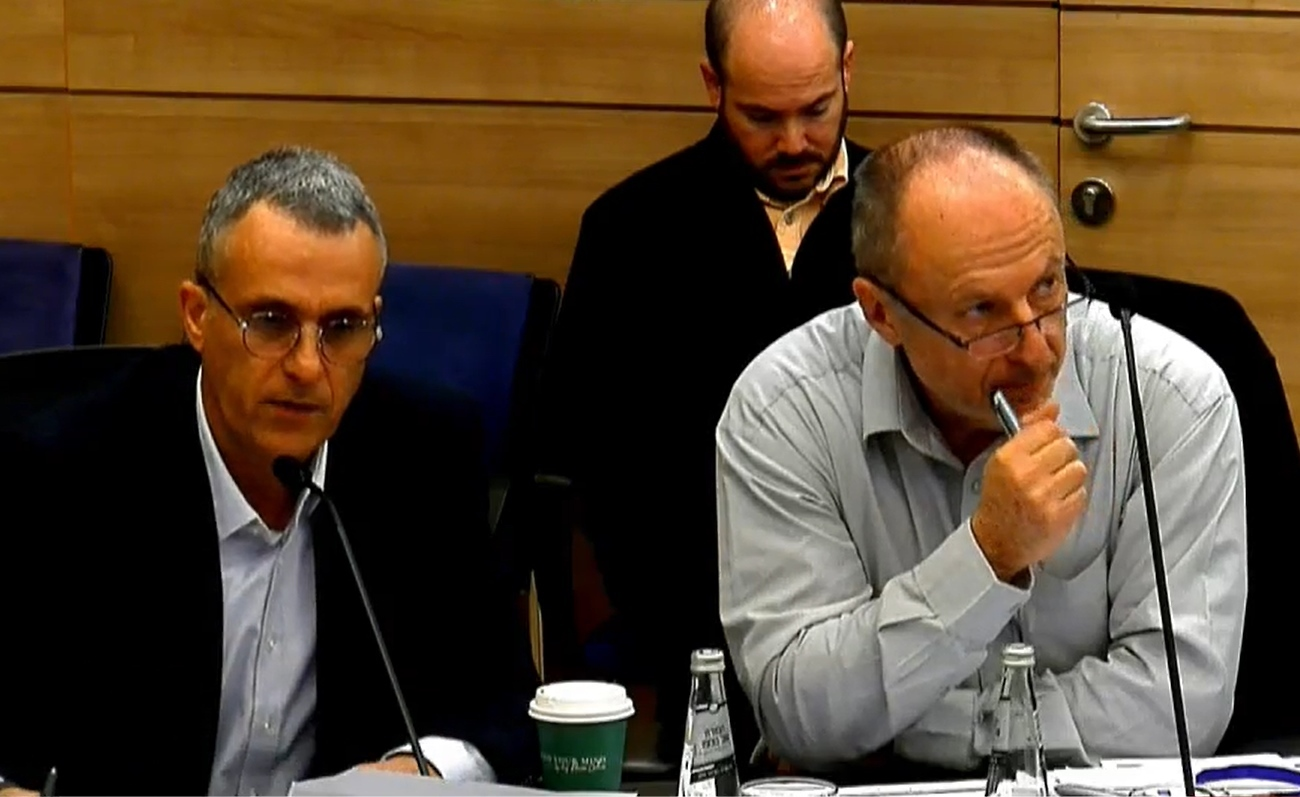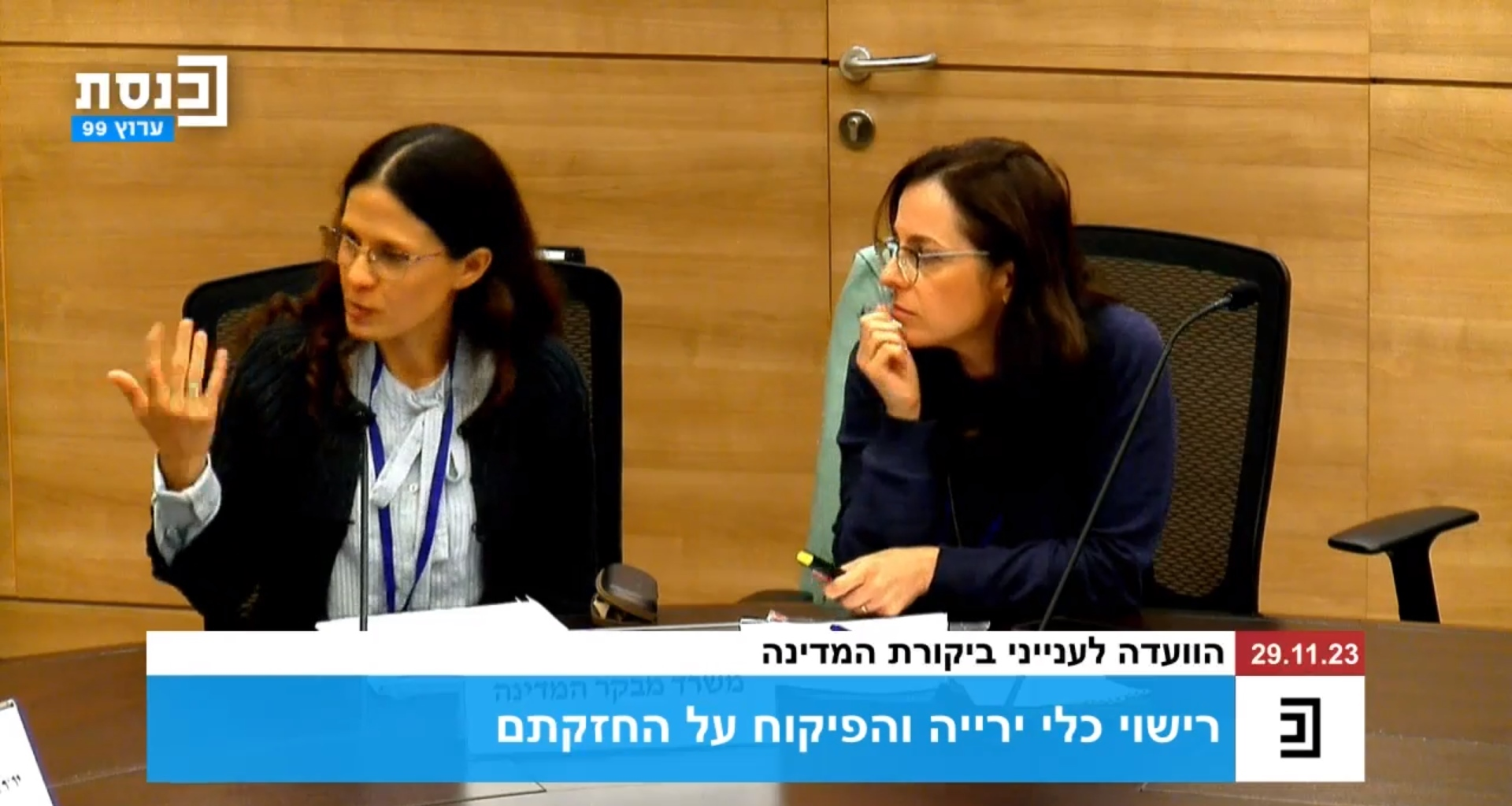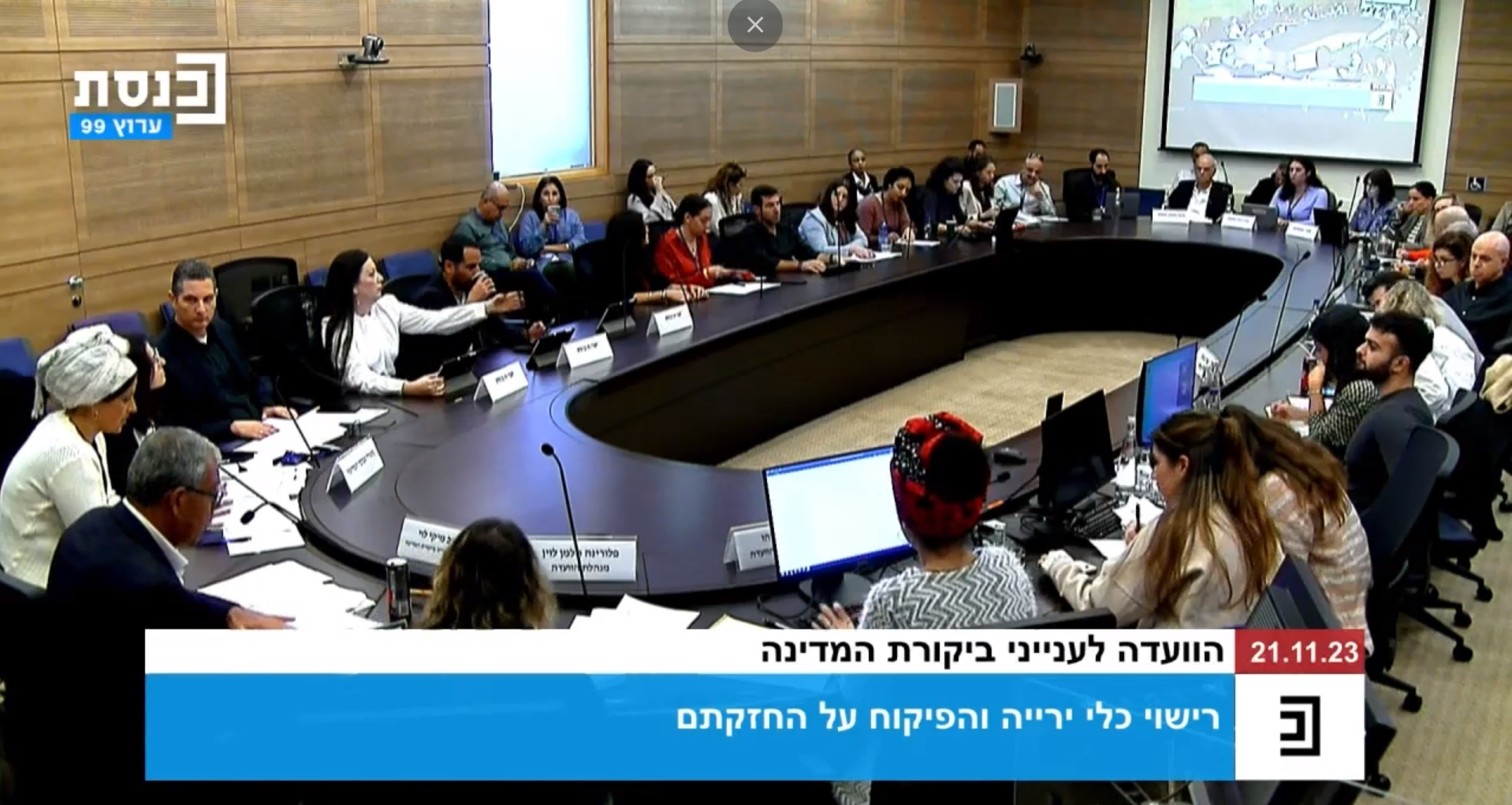Since the start of the Swords of Iron War, the Knesset State Control Committee has been holding ongoing discussions about audit reports published in recent years and that are relevant to various aspects of the present war. During the previous month (29.11-24.12.2023) the Committee discussed a variety of subjects which had arisen in the Comptroller's reports over the years – from the licensing of firearms and the supervision of their possession to preparedness for defending the home front against rockets and missiles.
Furthermore, the State Comptroller and Ombudsman, Matanyahu Englman, appeared before the Finance Committee (20.12.2023) in order to present the Office's budget for 2024 – and in his speech he referred to the audit of the war. "As we showed in the Ombudsman's report that we published yesterday, hundreds of thousands of residents of the Confrontation Lines in the north and south, who have been evacuated from their homes, have become needy and affected by the government's failure to deal with the home front shortly after the massacre", said the Comptroller. "This is a reality-changing event on a national level. The reality that existed until the day of the massacre cannot continue. This premise underlies the planning of the state audit of the events leading up to the massacre, the day of the massacre itself, and the events that Israeli citizens faced afterwards.
The organizational audit of the handling of the home front will begin within the next few days, with the start of the audit about the defense forces being conducted in accordance with the development of the war. Nevertheless, it is clear even now that the Israeli government and the defense forces must conduct a thorough internal examination as to how the great failure on 7.10 occurred".
Since the outbreak of the war the number of applicants for a firearms permit has skyrocketed. The State Control Committee has sought to examine the handling of these applications in light of the findings of the State Comptroller's report from May 2014, on the subject of the licensing of firearms and the supervision of their possession. The Committee discussed this in two separate sessions (29.11.2023 and 18.12.2023).
In the first discussion (29.11.2023), the Office was represented by Hila Orr, Deputy Director of Department F in the Government Ministries and Institutions Audit Division; Pnina Gonen, Assistant to the Division Director; and the Audit Director, Elad Schild. "We believe that it would be correct to look at the four main subjects that were examined in the previous audit and give our opinion on them today", said Orr. "Which actions are taken in order to ensure that the firearms licensing policy is carried out in a controlled, supervised and punctilious manner and does not expose society to significant risks? How is the coordination and cooperation between the various ministries regulated? We should also consider the professional, effective and purposeful response given to the hundreds of thousands of applicants. And finally, does the supervision only occur on the date the license is granted or is there sample control over the storage of the weapons, the installation of safes and more. In each one of these fields an updated database can bring forward barriers and challenges from which we should examine how the Ministry of National Security intends to manage this event successfully".
Gonen and Limor Kaplinsky-Avriel, Deputy Director of Department F in the Division, represented the Office in the subsequent discussion (18.12.2023). Kaplinsky-Avriel stressed that these four main subjects should be examined "while balancing the objectives of the law between a person's right to defend himself and the public's right to be safe".
A report published by the State Comptroller in May 2000, concerning the activity of the Consular Division at the Ministry of Foreign Affairs, was also on the Committee's agenda (19.12.2023), seeking to examine the Ministry of Foreign Affairs procedure for issuing official passports. The Director of the Government Ministries and Institutions Audit Division, Yuval Hayu, and Tzipi Schlesinger, Director of Department P at the Division, surveyed the main defects that arose in the report: Thus, for example, the Foreign Service Regulations did not contain directives concerning persons eligible to receive an official passport. The list of eligible persons had not been periodically updated and no sanctions had been prescribed for persons abusing the passport. Hayu noted that "The list of persons eligible for a diplomatic passport was not drawn up according to clear and methodological criteria and it included officials where the justification for their inclusion in the list was unclear".
In another discussion (19.12.2023), the Committee focused on the recommendations that had arisen from the Comptroller's report on the matter of the budgetary conduct during the COVID-19 crisis, and the lessons that should be learned from the report with regard to the budgetary conduct during the war. The Governor of the Bank of Israel, Professor Amir Yaron, was invited to the discussion, and he presented the changes that had taken place in the Israeli economy following the COVID-19 crisis and the geo-political crises that had occurred during the course of the past two decades.
Since 7.10, the home front has been suffering from rocket barrages and mortar shells from the Gaza Strip and from South Lebanon. The prolongation of the combat led the Knesset members to hold an additional discussion (20.12.2023) on the follow-up audit report published by the State Comptroller regarding the preparedness to defend the home front against the threat of rockets and missiles (physical protection, warnings and population evacuation) in August 2020. Eitan Dahan, Director of the Defense Forces Audit Division, presented the main points of the report alongside the Director of Department C in the Division, Eyal Sonnenfeld, and his Deputy, Sharon Shafir. The follow-up audit found that approximately 2.6 million residents in Israel have no proper protection near their place of residence (as of 2018) – including 50 thousand residents who live at a distance of up to 9 kilometers from the northern border and 231,650 residents who live at a distance of up to 40 kilometers from the border with Gaza. The follow-up audit found that 20% of the public shelters are not fit for use (as of 2019). Dahan noted that since the beginning of the war, the Comptroller and his staff have conducted many tours of the northern and southern localities, visiting the evacuation centres all over the country, so that "We have a lot of information about what is actually happening even though we have not yet conducted an audit in this matter".
The follow-up audit found that there is no periodic mechanism for updating the tariff for indemnification of the local authorities that are supposed to absorb evacuees. Dahan noted that the tours conducted during the war showed that "Even when decisions were made to grant budgets, it took a very long time for the budgets to actually arrive on site and provide a solution for the discrepancies". Regarding the evacuation of residents with special needs, Dahan said that at the time of the evacuation during "Swords of Iron", it transpired that "In many places that we visited, a population which should have received special attention did not receive it". Sonnenfeld added that "In view of the possibility of another population evacuation, perhaps under fire, due to the possible escalation in the north – it is worthwhile hearing how the various bodies are preparing themselves for this possibility". Dahan concluded by saying that "In the tours we conducted it became apparent that a state military operations room was needed, which would centralize all the government bodies and would be capable of solving complex interministerial problems".

 Photograph: The Knesset Channel
Photograph: The Knesset Channel
 Photograph: The Knesset Channel
Photograph: The Knesset Channel